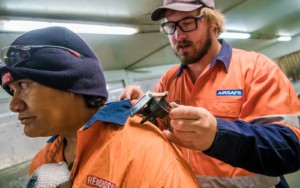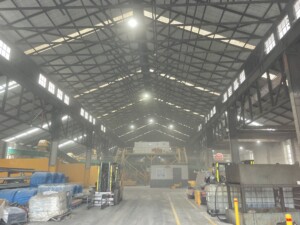What is silica?
Silica is silicon dioxide, a naturally occurring and abundant mineral that makes up the majority of rocks and soils.
Sand, stone, concrete, and mortar all contain a form of silica known as crystalline silica. Crystalline silica is also used to manufacture engineered stone. Engineered stone, also known as composite stone and sold under brand names including Caesarstone, Essastone and Quantum Quartz, is used to make a variety of products, in particular kitchen and bathroom benchtops. From 1 July 2024, the use of engineered stone in benchtops, panels and slabs will be banned throughout Australia (see below).
Crystalline silica can become a health hazard when dust is produced, which happens during mechanical processes such as crushing, cutting, drilling, grinding, sawing, or polishing of silica-containing natural or engineered stone. Some dust particles are so small that they cannot be seen: these are known as respirable crystalline silica (RCS) particles.

Health effects of respirable crystalline silica exposure
Because respirable crystalline silica particles are so small, they can lodge deep in the lungs and cause illness or disease. Note that non-crystalline or amorphous silica does not cause this type of lung damage.
The most serious disease caused by RCS is silicosis, an irreversible lung disease that causes permanent disability and can be fatal. Silicosis happens when RCS causes inflammation and scarring of the lung tissue that reduces the lungs’ ability to take in oxygen. Damage to the lungs from RCS and symptoms of disease may not appear for many years, but can also develop after a short exposure to high levels of RCS.
Over the past decade, more than 500 workers’ compensation claims have been made in relation to silicosis. The alarming incidence of disease has led the Australian Government and state governments to take action.
Upcoming ban on engineered stone
From 1 July 2024, there will be an Australia-wide ban on the use, supply and manufacture of engineered stone benchtops, slabs and panels. After the prohibition comes into effect, businesses will not be allowed to carry out work with engineered stone slabs, panels and benchtops or ask their workers to do so.
Silica hazards won’t go away
The engineered stone ban is designed to address the most common cause of silicosis among Australian workers. But it’s worth noting that once the ban is in place, the need to identify and control respirable crystalline silica exposure in the workplace won’t simply disappear. There are a number of reasons for this:
- Crystalline silica is found in natural stone as well as engineered stone, and similar hazards are present when natural stone is processed.
- Engineered stone products that are not intended to be processed, such as prefabricated sinks, jewellery and garden ornaments, will not be subject to the ban. Any work that involves processing a substance containing crystalline silica must be controlled.
- Repairs, minor modification, removal and disposal of engineered stone benchtops, panels and slabs installed prior to the ban will not be subject to the ban. Any work with previously installed engineered stone must be controlled, and businesses which plan to undertake permitted work with legacy engineered stone will be required to notify WHS regulators.
If you’re intending to work with products containing crystalline silica, before or after the ban is in place, contact Airsafe to make sure you’re meeting your duty of care to protect your workers.

-
The eight-hour time weighted average workplace exposure standard (WES) for respirable crystalline silica (RCS) is currently 0.05 mg/m3. This means that your workers must not be exposed to levels of RCS greater than 0.05 mg/m3 over an eight hour working day, for a five day working week.
Note that this exposure standard has halved from the previous standard of 0.1 mg/m3. This change happened from 1 July 2020. If a monitoring program was undertaken at your workplace before that date, the results may be out of date and need to be re-done, especially if the measured exposure was between 0.05 mg/m3 and 0.1 mg/m3.
-
Even if you’ve had respirable crystalline silica monitoring conducted before, it may need to be re-done if one or more of the following is true:
- Since the last assessment, there have been significant changes to work practices (e.g., new equipment being commissioned), production, processes (e.g., work process redesign), procedures, or control measures, which may reasonably be expected to result in new or additional exposures.
- A health monitoring report indicates an adverse result when the worker’s baseline or previous monitoring reports revealed no abnormalities.
- A health representative requests a review of control measures (as required by the current WHS regulation), but current air monitoring records are unavailable.
- Worker consultation results in a substantiated complaint from a worker or their representative, or a substantiated matter is raised by an entry permit holder regarding possible contravention of the workplace exposure standard, and current air monitoring records are not available.
- Previous air monitoring results were processed before the 1 July 2020 change in exposure standards (see above).
Contact us for a respirable crystalline silica risk assessment today
Whether you are concerned about potential worker exposure to crystalline silica, or wondering how to deal with the upcoming engineered stone ban, Airsafe’s experts can help.
For any questions about respirable crystalline silica identification, monitoring or control, call Airsafe on 1300 888 338.




